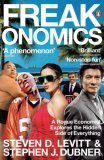Summary | Excerpt | Reading Guide | Reviews | Readalikes | Genres & Themes | Author Bio
A Rogue Economist Explores the Hidden Side of Everything

Critics' Opinion:
Readers' Opinion:
First Published:
Apr 2005, 256 pages
Paperback:
Apr 2006, 256 pages
Smith's true subject was the friction between individual desire and
societal norms. The economic historian Robert Heilbroner, writing in The
Worldly Philosophers, wondered how Smith was able to separate the
doings of man, a creature of self interest, from the greater moral plane in
which man operated. "Smith held that the answer lay in our ability to put
ourselves in the position of a third person, an impartial observer,"
Heilbroner wrote, "and in this way to form a notion of the objective ...
merits of a case."
Consider yourself, then, in the company of a third person -- or, if you
will, a pair of third people -- eager to explore the objective merits of
interesting cases. These explorations generally begin with the asking of a
simple unasked question. Such as: what do schoolteachers and sumo wrestlers
have in common?
Chapter One
What Do Schoolteachers and Sumo Wrestlers Have in Common?
Imagine for a moment that you are the manager of a day-care center. You
have a clearly stated policy that children are supposed to be picked up by 4
p.m. But very often parents are late. The result: at day's end, you have
some anxious children and at least one teacher who must wait around for the
parents to arrive. What to do?
A pair of economists who heard of this dilemma -- it turned out to be a
rather common one -- offered a solution: fine the tardy parents. Why, after
all, should the day-care center take care of these kids for free?
The economists decided to test their solution by conducting a study of
ten day-care centers in Haifa, Israel. The study lasted twenty weeks, but
the fine was not introduced immediately. For the first four weeks, the
economists simply kept track of the number of parents who came late; there
were, on average, eight late pickups per week per day-care center. In the
fifth week, the fine was enacted. It was announced that any parent arriving
more than ten minutes late would pay $3 per child for each incident. The fee
would be added to the parents' monthly bill, which was roughly $380.
After the fine was enacted, the number of late pickups promptly went ...
up. Before long there were twenty late pickups per week, more than double
the original average. The incentive had plainly backfired.
Economics is, at root, the study of incentives: how people get what they
want, or need, especially when other people want or need the same thing.
Economists love incentives. They love to dream them up and enact them, study
them and tinker with them. The typical economist believes the world has not
yet invented a problem that he cannot fix if given a free hand to design the
proper incentive scheme. His solution may not always be pretty -- it may
involve coercion or exorbitant penalties or the violation of civil liberties
-- but the original problem, rest assured, will be fixed. An incentive is a
bullet, a lever, a key: an often tiny object with astonishing power to
change a situation.
We all learn to respond to incentives, negative and positive, from the
outset of life. If you toddle over to the hot stove and touch it, you burn a
finger. But if you bring home straight A's from school, you get a new bike.
If you are spotted picking your nose in class, you get ridiculed. But if you
make the basketball team, you move up the social ladder. If you break
curfew, you get grounded. But if you ace your SATs, you get to go to a good
college. If you flunk out of law school, you have to go to work at your
father's insurance company. But if you perform so well that a rival company
comes calling, you become a vice president and no longer have to work for
your father. If you become so excited about your new vice president job that
you drive home at eighty mph, you get pulled over by the police and fined
$100. But if you hit your sales projections and collect a year-end bonus,
you not only aren't worried about the $100 ticket but can also afford to buy
that Viking range you've always wanted -- and on which your toddler can now
burn her own finger.
The foregoing is excerpted from Freakonomics by Steven D. Levitt and Stephen J. Dubner. All rights reserved. No part of this book may be used or reproduced without written permission from HarperCollins Publishers, 10 East 53rd Street, New York, NY 10022





The House on Biscayne Bay
by Chanel Cleeton
As death stalks a gothic mansion in Miami, the lives of two women intertwine as the past and present collide.

The Flower Sisters
by Michelle Collins Anderson
From the new Fannie Flagg of the Ozarks, a richly-woven story of family, forgiveness, and reinvention.

The Funeral Cryer by Wenyan Lu
Debut novelist Wenyan Lu brings us this witty yet profound story about one woman's midlife reawakening in contemporary rural China.
Your guide toexceptional books
BookBrowse seeks out and recommends the best in contemporary fiction and nonfiction—books that not only engage and entertain but also deepen our understanding of ourselves and the world around us.